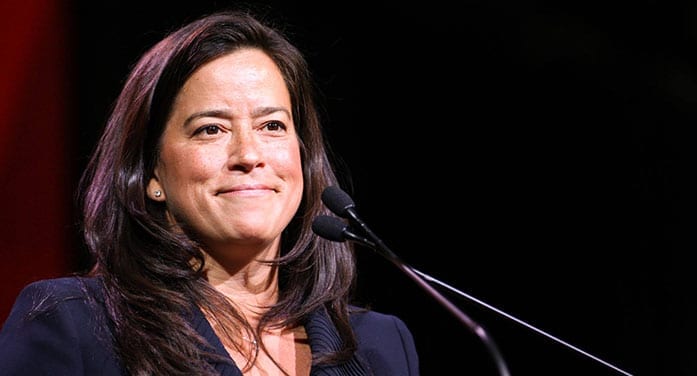 In the year before the pandemic, Jody Wilson-Raybould was Prime Minister Justin Trudeau’s worst headache.
In the year before the pandemic, Jody Wilson-Raybould was Prime Minister Justin Trudeau’s worst headache.
In a speech she gave on Wednesday, the former justice minister and attorney general showed why she could become the PM’s worst nightmare.
“This practice, this hypocrisy, the affirmation of Charter rights … but denial of Indigenous rights is, in my opinion, the most insidious and prime example of systemic racism rooted in the legacy of colonialism that remains pervasive at the highest levels of government and underpins the relationship between Indigenous peoples and the Crown,” Wilson-Raybould said.
Then she added a scorcher.
“The practice of denial has not changed. Unfortunately, shamefully and disappointingly, we can look at the current government as an illustration,” she told the audience for the Tom Courchene Distinguished Speaker Series hosted by Queen’s University’s School of Policy Studies.
Nor did she just shellac “the government” in the abstract. She named her former boss directly. She lit into a speech that Trudeau gave in the House of Commons on Feb. 14, 2018, in which he “acknowledged he and his government knew of this long-standing hypocrisy” and promised considerably more than a heart-shaped box of chocolates to make up for it.
“Imagine the mounting disappointment, the unsurprising and familiar headache, the rising tide of anger when … within a few months of the Valentine’s Day speech, those aspirations were abandoned. The government does not even talk about them anymore,” she said.
Wilson-Raybould calling out Trudeau or his government is hardly new. Her insistence on holding the PM and his consiglieres accountable during the SNC-Lavalin scandal got her bounced from cabinet and ultimately out of the Liberal caucus. Partisans might also dismiss her caustic criticism as the continued sour grapes of a former senior player in Liberal power circles now exiled to the nowhere land of independent MP for Vancouver Granville.
The weakness of such a dismissal is dangerous. It overlooks the objective reality that Wilson-Raybould is an independent MP precisely because of her bred-in-the-bone independence. As one of Trudeau’s insider cabinet ministers, she refused to budge from her position that she held the role of attorney general in order to be independent.
Failure to recognize that reality risks underestimating the appeal for someone like Wilson-Raybould of pursuing a path outside Parliament – and even as a direct challenge to it. And just such a path is now open for her.
In early July, the Assembly of First Nations (AFN) holds a leadership vote to replace National Chief Perry Bellegarde. He announced last December he wouldn’t seek a third term atop the organization that advocates for 900,000 First Nations people across Canada. One candidate has declared for the job so far. It’s speculation whether Wilson-Raybould will add her name to the list.
As reporter Robert Fife wrote in a May 12 Globe and Mail story, “former Liberal justice minister Jody Wilson-Raybould has not ruled out seeking the top AFN job.”
And writing in the Hill Times last week, Rose LeMay argued just such a figure is needed to combat what she identified as a serious #MeToo problem inside AFN.
“Will this be the time when First Nations commit to respect women in all aspects of governance of this national organization? Will any women run for national chief, or is it still the old boys club?” demanded LeMay, CEO of the Indigenous Reconciliation Group.
Last January, in a Globe opinion column looking ahead to the AFN vote, Indigenous campaign organizer Tania Cameron surveyed the past quarter-century of strong women candidates who’ve failed to breach that old boys network.
“That’s 10 women over 26 years who have felt the sting of defeat, a discouraging result for any talented Indigenous women hoping to achieve high office,” Cameron wrote.
As it happens, Wilson-Raybould has achieved the high office of justice minister and attorney general of Canada. And as she said in her speech at Queen’s University, her “experience at the centre of government” showed her the disheartening effect of relying entirely on Parliament to change the relationship between the federal government and Indigenous people.
Does that make her remarks the equivalent of a campaign kickoff for the AFN top job?
Hardly. But even taken as a hint that she’s considering a run, the implications for Canadian politics are profound. They’re deeply meaningful for Indigenous causes, signalling the potential for radically different days ahead.
For Trudeau, they would undoubtedly mean the paradox of sleepless nights and rude awakenings.
Peter Stockland is senior writer with the think-tank Cardus and editor of Convivium.ca.
Peter is one of our Thought Leaders. For interview requests, click here.
The views, opinions and positions expressed by columnists and contributors are the authors’ alone. They do not inherently or expressly reflect the views, opinions and/or positions of our publication.
© Troy Media
Troy Media is an editorial content provider to media outlets and its own hosted community news outlets across Canada.


